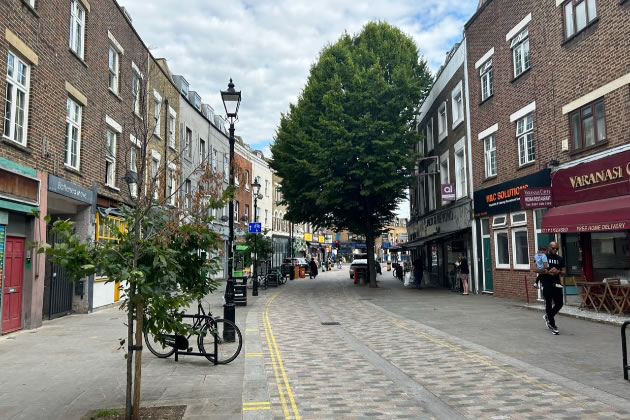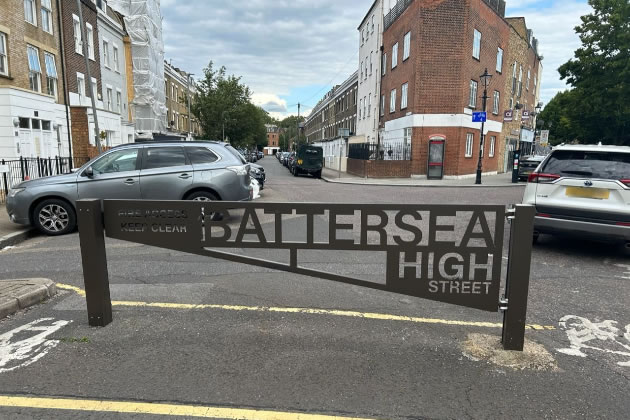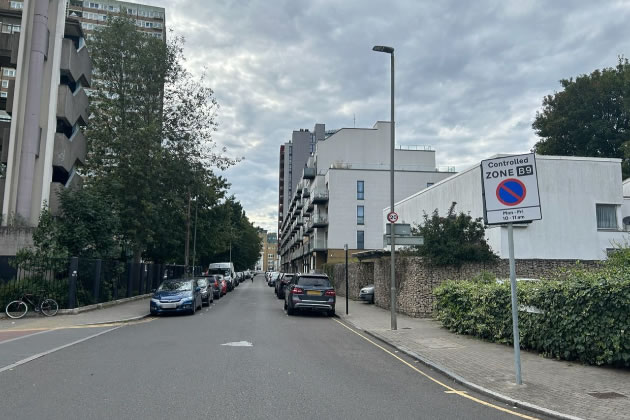New Battersea Parking Scheme Causing Problems
Residents of newer buildings unable to get a permit

Abdiweli Hassan, 53, on Battersea High Street
July 27, 2023
There are calls for an “experimental” parking scheme in Battersea to be rethought as it has caused unintended problems for residents who live in modern buildings. Parking wardens prowl certain streets around North West Battersea knowing they’re almost guaranteed to find someone to ticket because of the confusion caused by a scheme that bans non-permit holders from parking for just an hour on weekdays.
But the knock-on effect of the idea to stop commuters headed to Clapham Junction station or Battersea Power Station’s Tube stop from abandoning their care for free, has been that residents in developments approved after 2003 are unable to get a permit. This means them having to find a way to move their cars between 10 and 11am Monday to Friday, or not park near their homes at all.
Only residents in the new Battersea B9 Controlled Parking Zone (CPZ) with permits can park on their roads from 10am to 11am on Mondays to Fridays under the scheme introduced by Wandsworth Council, which has not been made permanent yet. Anyone caught without a permit faces an £80 fine. But people living in developments approved after 2003, with 10 or more homes, can’t get permits due to the planning process.
A petition from residents living in post-2003 buildings on Gwynne Road, in the zone, calls on the council to overturn the decision. It claims they are “constantly facing parking fines” and must find another place to park for an hour on weekdays. The petition has been signed by 13 people so far and says the zone is “causing more problems than the cars left for free by commuters”.
The zone also operates from 8am to 6pm, Mondays to Fridays, for visitor bays. It follows the permanent pedestrianisation of part of Battersea High Street, with only some vehicles exempt from the restrictions – including those registered to residents and businesses, and for loading purposes. The pedestrianisation is another contentious issue as traders say shoppers visiting local businesses are being put off and they are losing money.
When the Local Democracy Reporting Service visited the neighbourhood, locals expressed mixed views about the changes. Abdiweli Hassan, 53, lives in the B9 parking zone. He praised the scheme as he said visitors previously parked on his road to “take a train” or “go for a walk [for the] whole day” – making it “difficult” for residents to find spaces.

Battersea High Street
But he said the pedestrianisation of the High Street, where he works, has caused problems as taxis “cancel” on residents because they can’t enter the zone, and some shoppers go elsewhere as they need taxis when buying “a lot of food”. Mr Hassan has lived in Battersea for around 14 years and said customers face fines as some do not know about the changes. Speaking of a man who visited his shop the previous day, he said: “[He] knew before this area was OK [to park in], that’s why he came,” but added “he will get an £80 penalty” and will not return. He said: “A lot of customers I had before, they didn’t come back.”
Parking was also tricky before, according to Mr Hassan, as the area “was full of minicabs” taking up the parking spaces and businesses were “complaining about it [being] difficult to get a loading car for their deliveries”.
He said: “The way [it is now] is OK. We’ve got problems and I’m losing customers, but if they take that problem [away] also we will get [a different] problem because [in] this area [there are] a lot of minicabs [which will sit on the streets taking up the parking spaces].”

Battersea High Street
Wandsworth Council has said the scheme has not yet been made permanent and any feedback will be considered, and added that it’s designed to stop “dangerous or nuisance parking”.
Sadia, who did not wish to give her surname, also lives in Battersea and plans to open a shop on the High Street. She said people are worried about being fined if they “visit and make a mistake parking”. She said: “Every morning, you can see people looking and putting tickets. Wardens are everywhere in Battersea.”
Sadia, who has lived in Battersea for more than 25 years, said the neighbourhood has changed a lot. She said: “It’s a lot of change. The parking has changed, the people have changed, a lot of building and development has changed.” She added the rent is “too expensive” and is “going up every year, up and up, especially in Battersea so more people come”.
Brian, who did not wish to give his surname, rents a flat in the B9 parking zone. The 30-year-old can’t get a permit to park on his road from 10am to 11am as he lives in a block approved after 2003. He said the restrictions “rule out” buying a home there as, although he has a space in an underground car park included in his development, he could not get a second space for another car – meaning he would not buy the flat. But he added people abandoning “their cars on the road for a full 24 hours” was an issue before the scheme.
 Gwynne Road, Battersea
Gwynne Road, Battersea
Gina Donkor, 66, has a permit but claimed the scheme has caused other problems as “the wardens don’t come anymore” to her road. The mum said visitors use residents’ spaces, instead of parking on the road so actually the issue the scheme was designed to prevent is still there, just in different roads.
She said: “We are paying [for] the parking space for somebody to come and park and leave their car there and travel. Sometimes they leave it there for months before they come and take it. I think it’s wrong and sometimes my children will come here, they won’t get a place to park because somebody has parked there. We are paying it.”
Ms Donkor added: “They don’t park [on the road], but it’s free when you park from 11am, it’s free. I don’t know why people don’t park there.”
A Wandsworth Council spokesperson said: “The Battersea B9 CPZ has been introduced to remove commuter and other long-stay free parking thereby improving parking conditions for residents, their visitors, essential business vehicles and those using local facilities. The B9 zone has been introduced under an experimental traffic management order to provide a period of operational experience and the council will consider feedback from local residents and businesses when deciding whether any changes should be made, or if the scheme should be made permanent.
“CPZs operate throughout most of the borough to prioritise the limited available on-street parking for the local community. Removing commuter and long-stay parking makes it easier for residents and their visitors to park near their home. Because CPZs designate where it’s safe to park and where it’s not, they create better visibility at junctions, improve access for emergency services and other large vehicles like rubbish/recycling or removals trucks and delivery vans.
“Preventing dangerous or nuisance parking also helps to improve road safety for all users of the highway and reducing traffic volumes/congestion contributes towards improved air quality. CPZs help to discourage private vehicle ownership and promote the use of more sustainable transport options, such as public transport and active travel e.g. walking and cycling, in line with the council’s wider transport policy.”
Charlotte Lilywhite - Local Democracy Reporter